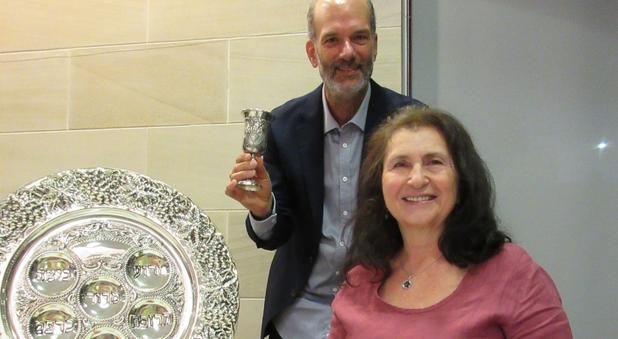Who would you regard as the most unreached people groups with the news of Jesus? Tribes on the Subcontinent, perhaps, or certain ethnic groups in China, northern Africa or the Middle East?
All of the above are true, of course, but there’s one group spread around the globe that is one of the least reached with the gospel, and that’s Jewish people.
Less than 0.01 per cent of Jewish people claim Jesus as their Lord and Saviour
As surprising as it might be to learn, according to the International Mission to Jewish People less than 0.01 per cent of Jewish people claim Jesus as their Lord and Saviour.
“A lot of the perception of Christians about Jewish people is that they should know about Jesus already,” says Rahel Landrum – who works for the IMJP (formerly Christian Witness to Israel) with her husband Mark. “What we explain to them is that a Jewish person might live near a church, but they don’t see that it’s for them to investigate Jesus.
"We grew up hearing that Jesus is not for us, he’s for the Gentiles.”
Adds Mr Landrum: “We explain to people that you don’t have to leave your Jewish identity and culture to become a believer in Jesus”.
The couple live in Bondi, the heart of Judaism in Sydney, where their main focus is individual evangelism. They meet up with local Jewish people, share Scriptures and help them understand not only “the Jewishness of Jesus” but that it is possible to be a Christian and Jewish at the same time – just like Jesus’ apostles.
The Landrums attend Bondi-Waverley Anglican when they’re not visiting churches around the country to talk about the work they do and share the Jewish roots of the Christian faith.
For example, most Christians know the origin of Passover from the book of Exodus, as well as the biblical links to Jesus – the Lamb of God, sacrificed for us. But the Jewish Passover celebration contains many other symbolic links to the Messiah.
“As you partake of the parsley dipped in salt water, the horseradish and things like that... those traditional elements of the Passover service point to Jesus,” Mr Landrum says.
In addition to the food at a Passover celebration, four cups are used: the kiddush cup, which stands for sanctification; the cup of plagues; the cup of redemption; and the cup of praise, or the hallel – as in “hallelujah”.
Seeing all these connections to Jesus in a Jewish festival is a profound experience for the Christian. But there are numerous barriers for Jewish people to overcome in order to hear and listen to the news about the Messiah – whether it’s because of the suffering their people went through “at what they perceive as the hands of Christians”, because becoming a believer in Jesus is not a popular thing to do, or because they think he simply isn’t relevant to them.
Discovering the Messiah
Mrs Landrum uses her own experience as an example. She grew up in Israel, and when she was 16 her mother became a believer and started going to a Messianic congregation. Her husband and Rahel tagged along, and this was the first time Mrs Landrum heard about Jesus being Jewish, and for Jewish people.
She did not believe it herself for a couple of years but began to notice that potential references to Jesus were avoided. Such as when the class at her public school gradually read through the book of Isaiah but skipped chapter 53.
“I was the only one in the whole class who asked the teacher, who was an orthodox man, ‘Why are we skipping this?’,” she recalls. “He blushed and mumbled something – I couldn’t understand what he was saying – and we read on. He knew what it was about but he didn’t want any controversy in his class. People don’t want to [hear] because they then have to deal with this Jesus.”
She adds that when she and her husband are speaking to Jewish people one on one and refer to Messianic prophecies such as Isaiah 53, “they think we’re reading from the New Testament”.
As an 18 year old, Mrs Landrum went out of her way to study Old Testament prophecies to prove that Jesus wasn’t the Messiah. “I wanted to be like everybody else... but then when I looked at the prophecies about who the Messiah is and the pictures of Jesus, I saw those two pictures are identical”.
As part of their daily mission work the Landrums are keen to support any Christians with Jewish friends who want to share Jesus with them. “We give them tips on how to start a conversation, what to do and what not to do, because there are some things that might be offensive to Jewish people and Christians might not be aware of them,” Mrs Landrum says.
“We love what we do – we’re very passionate about sharing the gospel with Jewish people and with others who want to know the gospel from a Jewish perspective.”
Adds Mr Landrum: “It’s slow and difficult, and there are a lot of challenges to overcome socially and culturally, but it’s worth it.
"We rejoice when a Jewish person comes to know Jesus – like Saul, who prayed with me recently to receive Jesus.”
Pastors interested in the International Mission to Jewish People speaking at their church should email Mark Landrum.






















